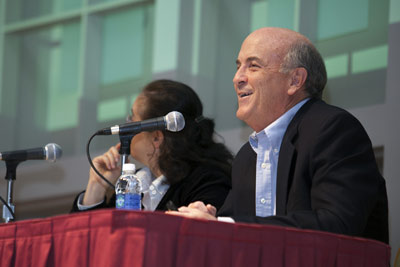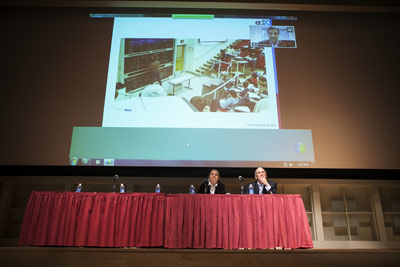Are there MOOCs in Cornell's future?
By Bill Steele


What should Cornell do about MOOCs?
As those attending a faculty forum on the topic Sept. 27 learned, it's not an easy question.
MOOCs -- Massive Open Online Courses -- are not the usual sort of online learning, as explained to the forum by Éva Tardos, the Jacob Gould Schurman Professor of Computer Science, and David Easley, the Alan Henry Scarborough Professor of Social Sciences. A typical course may have thousands of students. The first MOOC was a course in artificial intelligence offered in 2011 by Stanford University professor Sebastian Thrun, with 160,000 students enrolled all over the world. Only 20,000 completed the course, but that's still a lot.
Courses are free, although some providers charge for a certificate that says you've completed the course. Prestigious universities are offering courses, but none of them are giving college credit. That doesn't seem to matter to the students. Observers find they seek to acquire skills rather than credentials. The majority of courses so far are in computer science.
Leading players in the field are Udacity, with 14 online courses; EdX, a consortium of Harvard University, the Massachusetts Institute of Technology and the University of California-Berkeley with seven; and Coursera, with 197 courses from 33 universities. All claim to be "democratizing education."
And that's the issue. Is it the mission of the university to educate the world for free? "We can educate the people who don't have the means or the ability to show up on campus," Tardos said. "This is a revolution in education, and if we do not participate and experiment with it, then too bad for us."
Provost Kent Fuchs and Joe Burns, dean of the faculty, have appointed a committee chaired by Tardos to consider the issue. "We should decide by the end of this semester whether or not to join one or more of these consortia," said Fuchs.
MOOCs are not just online lectures. Often short video clips are mingled with interactive exercises. "Crowdsourcing" replaces one-on-one with a teacher. Students pose questions in discussion forums and other students answer; because there are so many students, spread over many time zones, an answer typically returns in about 20 minutes. Students form spontaneous study groups, either online or live. Tests with multiple-choice or numerical answers can be graded automatically; others rely on "peer grading."
The forum audience saw presentations by Anant Agarwal, director of MIT's Artificial Intelligence Laboratory and president of EdX, and Daphne Koller, professor of computer science at Stanford and a co-founder of Coursera, both via videoconferencing. Agarwal suggested that online courses offer a form of individualized instruction, citing research showing that individualized learning outperforms lecture courses. Koller displayed an example of an online laboratory in a course on electronic circuits. Peer grading, she said, has been shown to correlate closely with grading by instructors.
These presenters and local speakers suggested that materials developed for online courses can be used in campus classrooms, that an online presence could enhance the image of a university, and that forming online communities of students can be an education in itself, as students from many cultures interact and inform one another. The downside is that creating free courses takes faculty time and university resources. MIT, Tardos reported, is giving faculty time off from regular teaching to work on MOOCs.
The committee examining the future of MOOCs at Cornell will include Fuchs, Burns and Easley, along with Steve Strogatz, the Jacob Gould Schurman Professor of Mechanical and Aerospace Engineering; Kavita Bala, associate professor of computer science; Sean Nicholson, professor of policy analysis and management; and Laura Brown, the J. W. Anderson Professor of English and vice provost for undergraduate education.
Media Contact
Get Cornell news delivered right to your inbox.
Subscribe